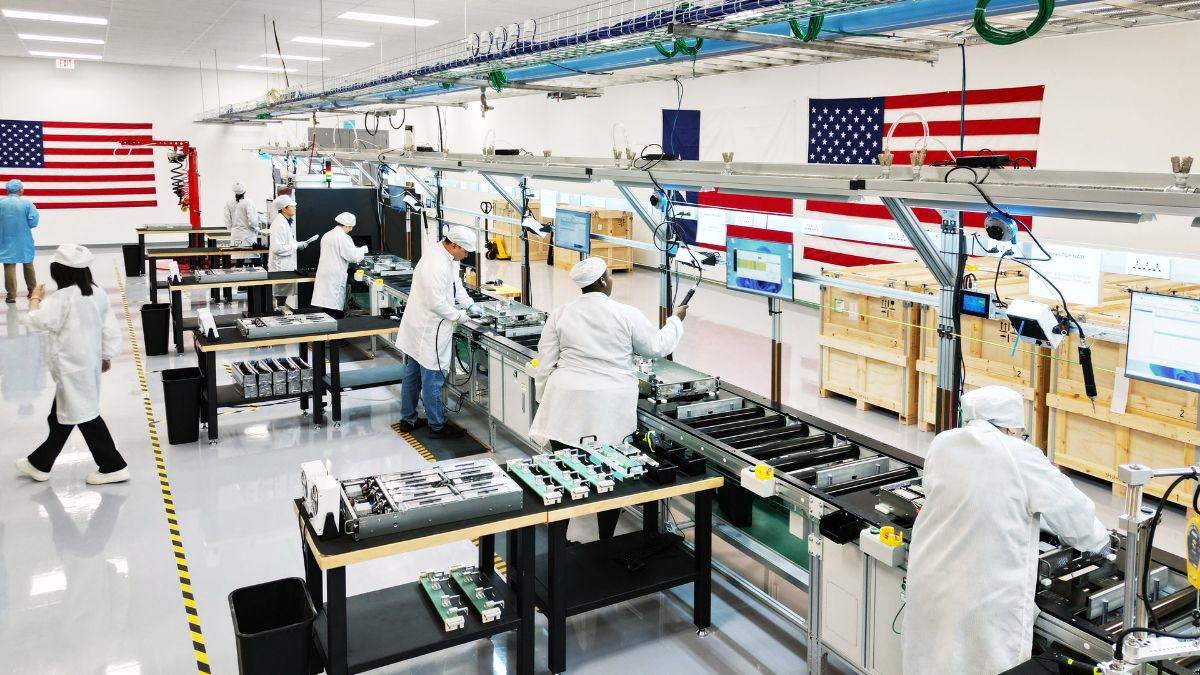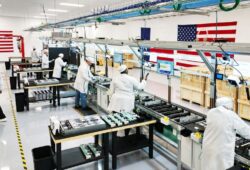
Apple announced a historic investment of $600 billion in the United States over the next four years. The announcement, interpreted by markets as a move to counter tariffs, was made by the company’s CEO, Tim Cook, at a joint press conference with President Donald Trump at the White House, marking a key moment in the tech company’s relationship with the U.S. government.
ALSO READ. Trump’s tariffs drive iPhone panic sales
“Today, we’re proud to increase our investments across the United States to $600 billion over four years and launch our new American Manufacturing Program,” said Cook, emphasizing that this is a significant expansion from the previous $500 billion commitment.
President Trump, known for his protectionist stances and intention to reduce reliance on Asian manufacturing, praised Apple’s commitment. “This is a significant step toward the ultimate goal of ensuring that iPhones sold in the United States also are made in the United States,” he said. He added: “Today’s announcement is one of the largest commitments in what has become among the greatest investment booms in our nation’s history.”
What is the American Manufacturing Program?
The new program called the American Manufacturing Program (AMP) is at the core of this investment. Its purpose is to strengthen the domestic supply chain, attract global companies to produce critical components in the U.S., and expand advanced manufacturing capabilities nationwide.
“This includes new and expanded work with 10 companies across America. They produce components — semiconductor chips included — that are used in Apple products sold all over the world, and we’re grateful to the President for his support,” added Tim Cook in his statement.
Which companies are involved in this strategy?
Apple’s new manufacturing partners include giants such as Corning, Texas Instruments, Amkor, Broadcom, Coherent, Applied Materials, GlobalWafers, TSMC, Samsung, and GlobalFoundries. Each of these companies will play a key role in developing components for Apple products like the iPhone and Apple Watch.
For instance, Apple and Corning are working together to expand the world’s largest smartphone glass production line in Harrodsburg, Kentucky. Soon, every iPhone and Apple Watch will feature protective glass made in the U.S. Additionally, the two companies will open a new Apple-Corning Innovation Center in the state.
How does this respond to tariff pressures?
Apple has faced criticism from President Trump for its attempts to shift iPhone production to India, which aimed to avoid the tariffs his Republican administration had imposed on China. During a trip to Qatar, Trump said, “There’s a little problem with Apple” and recalled telling Cook that he didn’t want manufacturing to happen in India, according to AP.
As part of his strategy, Trump recently signed an order to impose an additional 25% tariff on India for its use of Russian oil, potentially raising total tariffs on Indian goods to 50%.
How many jobs will Apple create with this investment?
Apple has emphasized that approximately two-thirds of components made in the U.S. are exported to other countries, highlighting the quality and competitiveness of domestic manufacturing. The company also already collaborates with suppliers in all 50 states, supporting over 450,000 indirect jobs.
Through this new commitment, Apple plans to directly hire 20,000 more people in the U.S., mainly in key areas such as research and development, silicon engineering, software development, and artificial intelligence.
Will Apple produce chips entirely in the United States?
Yes. The company is building an end-to-end silicon supply chain within the United States. This involves everything from silicon wafer development to chip manufacturing and packaging.
Apple estimates that this domestic manufacturing network will be capable of producing over 19 billion chips by 2025, many of which will be developed at TSMC’s Arizona facilities, where Apple is already the main customer.
Where are Apple’s new factories located?
Key developments include:
- Harrodsburg, Kentucky: Glass production for iPhone and Apple Watch.
- Sherman and Austin, Texas: Wafer and chip technology production with companies like GlobalWafers, Coherent, and Samsung.
- Fort Worth, Texas: Expansion of MP Materials to produce recycled rare earth magnets for Apple devices.
- Phoenix, Arizona: TSMC produces advanced chips for Apple.
- Malta, New York: GlobalFoundries will manufacture advanced wireless technologies.
- Lehi, Utah: Texas Instruments will increase production capacity with Apple’s support.
- Chandler, Arizona: Apple will invest in Amkor’s new chip packaging and testing center.
Apple expands its tech infrastructure
Apple is also investing in infrastructure to enhance its cloud services and AI capabilities:
- In Houston, construction has begun on a factory for Apple Intelligence servers. Mass production is expected in 2026.
- In Maiden, North Carolina, the Apple data center is being expanded, with over $5 billion already invested in the region. This center operates on 100% renewable energy.
- Additional data center projects are underway in Iowa, Nevada, and Oregon.
- In Austin, Texas, construction continues on Apple’s second campus, which already employs over 13,000 people and will feature new buildings for Hardware Engineering and Software.
Investment in education and technical training
Yes. On August 19, the new Apple Manufacturing Academy will open in Detroit, as announced in February. The academy will provide training to small and medium-sized businesses on how to implement advanced manufacturing and artificial intelligence in their operations.
Why is this investment key to Apple’s future?
Beyond reinforcing its commitment to local manufacturing, Apple is responding to geopolitical tensions, tariffs, and the need to secure a more resilient supply chain. With this, the company aims to lead not only in technological innovation but also in industrial sovereignty.
As Sabih Khan, Apple’s chief operating officer, explained: “We’re committed to supporting U.S. suppliers involved in every key stage of the chip-making process — from the earliest stages of research and development, to final fabrication and packaging. We want America to lead in this critical industry.”
This investment strengthens Apple’s position not only as a leader in developing products like the iPhone but also as a major driver of the U.S. economy, aligning with the interests of the White House and taking a strategic approach that could redefine the future of the global tech sector.
⇒ SUBSCRIBE TO OUR CONTENT ON GOOGLE NEWS









